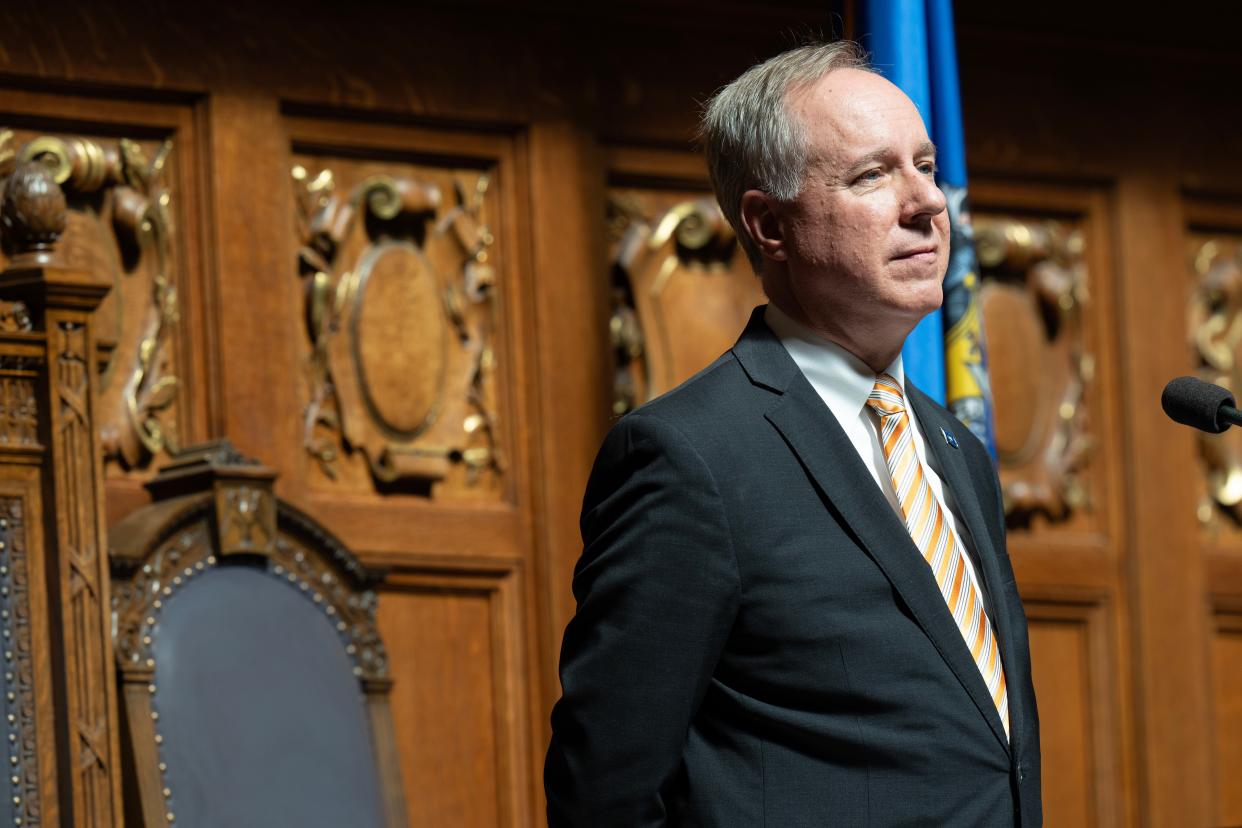Assembly approves an overhaul of Wisconsin redistricting aimed at short-circuiting court challenges

- Oops!Something went wrong.Please try again later.
- Oops!Something went wrong.Please try again later.
MADISON – Assembly lawmakers passed legislation late Thursday that would overhaul how Wisconsin's legislative boundaries are drawn, adopting an "Iowa-style" nonpartisan redistricting process that Republicans are now embracing in order to bypass the state Supreme Court's new liberal majority.
Just one Democrat joined Republican lawmakers in passing the legislation, which directs nonpartisan legislative staff to draw new maps that would replace the current legislative boundaries that were put in place in 2022.
Assembly Speaker Robin Vos is pursuing the legislation after opposing the idea for years. His about-face comes after the April election of Supreme Court Justice Janet Protasiewicz, which flipped the state Supreme Court to liberal control — giving Democrats a chance for the first time in more than a decade to rewrite the state's electoral maps that currently heavily favor Republicans.
Despite a decade of efforts from Democratic lawmakers to implement similar measures, the minority party bristled at the GOP proposal, voicing a number of concerns with the bill as it was introduced and criticizing Republicans for rushing the bill to a full vote without a public hearing.
Republican lawmakers put forward a series of amendments on Thursday to address some of the Democrats' concerns.
"We’ve adopted every single change to correct any problem that we have heard. So the only thing that’s left, is what? A deafening silence from those on the left. Because they have no argument. No argument why they oppose the plan. None. None," Vos said on the floor.
Rep. LaKeshia Myers of Milwaukee was the only Democratic lawmaker to join Republicans in supporting the bill.
"Black folks and Hispanic folks in the state of Wisconsin have been screwed by Democrats and Republicans equally, so we get to be friends with benefits with everybody," Myers said. "When you have to lead, it means something. It’s not about staying in this body forever. It’s about doing the work while you’re here. And sometimes, just sometimes, that means having a conversation. That means actually engaging."

Two lawsuits seeking to overturn the current legislative maps are before the state Supreme Court. Vos and other Republicans have warned if Protasiewicz does not recuse from such cases they could consider impeaching her because she called the maps "rigged" while campaigning and received about $10 million from the Democratic Party of Wisconsin, which stands to benefit from new maps.
Vos announced this week he is assembling a panel of former state Supreme Court justices to probe whether the Assembly could pursue impeachment of Protasiewicz if she does not recuse. The state Constitution allows for impeachment only in cases of crime or corruption.
Democrats launched a $4 million ad campaign in response to Vos' threats of impeachment in recent weeks.
Several Democratic lawmakers accused Assembly Republicans of pushing the redistricting bill to distract from talk of impeachment, or of making a last-ditch effort to hold onto power before the electoral maps go under the state Supreme Court's review.
"We are here today debating this bill because you see the ultimate outcome ahead and must distract the people of Wisconsin with another political stunt," Rep. Kalan Haywood, D-Milwaukee, said during Tuesday night's debate. "Now that you are faced with the potential consequences of your actions, you are trying to change the rules as you always have."
According to the Wisconsin Democracy Campaign, which tracks these efforts, 57 of Wisconsin's 72 counties have indicated support for nonpartisan redistricting through a referendum, resolution or both.
Senate Majority Leader Devin LeMahieu, R-Oostburg, has been noncommittal on whether the chamber would take up the bill. From there, the proposal would go to Evers, who has promised to veto it.
While nonpartisan redistricting is a new direction for Vos, some Republicans — especially those in swing districts — and Democrats have introduced it in previous sessions.
"This is the perfect timing. I'm a little surprised by the hypocrisy that will be brought out by our members today. Some people all of a sudden are opposed to exactly what they've been advocating for," Rep. Todd Novak, R-Dodgeville, who has co-authored nonpartisan redistricting bills since winning a competitive seat in 2014, said before the floor session.
More: Why Wisconsin Republicans suddenly embraced redistricting changes and Democrats want no part of it
The bill would require the nonpartisan Legislative Reference Bureau to draw maps without giving either side an advantage and without accounting for incumbency.
The reference bureau would report to a five-member advisory commission. The commission would consist of two Democrats and two Republicans, and those four members would then choose a fifth member, who would serve as the commission's chairperson.
Under the bill, the LRB would submit maps to the Legislature, which could reject the first two proposals. Once a third proposal is introduced, lawmakers could amend it with a simple majority. It would then require the governor’s approval, and would likely end up in the courts without an agreement — unless the Legislature were able to override the governor’s veto.
Republicans proposed seven amendments Thursday night in attempts to shore up support among Democrats.
The first, which added a line specifying that the Legislative Reference Bureau would provide assistance to the redistricting advisory commission regarding its operations, passed on party lines.
The second, which added a requirement that if the redistricting process went to a third round, the maps could only be approved with bipartisan support, picked up one Democratic vote: Milwaukee Rep. Marisabel Cabrera. The same was true of the third, which added provisions aimed at preventing a deadlock on the advisory commission.
A fourth amendment, which stipulated that the commission must, with recommendations from the LRB, appoint someone with expertise in the federal Voting Rights Act to offer guidance, picked up another Democratic vote: Milwaukee's Myers. It passed 66-32. The same was true of the fifth, which reined in the Legislature’s influence in the case of a third set of maps, limiting any amendments to corrective language.
The final two amendments passed with the support of Republicans, Cabrera and Myers. The sixth adjusted a requirement that public hearings must be held in Madison and in the northern half of the state, to add Milwaukee to the list. The final amendment added a requirement that the drafting file for the maps must be available for public inspection.
Assembly Minority Leader Greta Neubauer, D-Racine, said ahead of the floor session that Democrats are working on introducing their own bill to implement nonpartisan redistricting.
More: Robin Vos proposed 'Iowa-style' redistricting for Wisconsin. What does that mean?
Hope Karnopp of the Milwaukee Journal Sentinel contributed to this story.
This article originally appeared on Milwaukee Journal Sentinel: Wisconsin Assembly adopts redistricting overhaul patterned on Iowa

